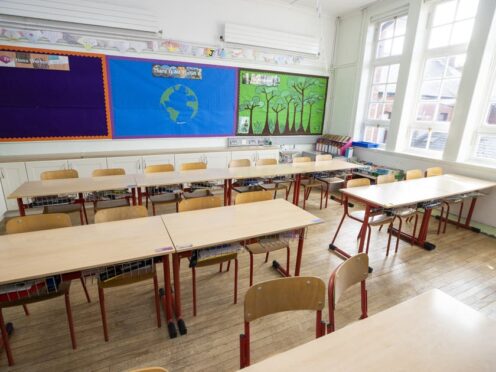
Dozens of councils in England have seen a sharp rise in the number of children being removed from school to be home educated since the Covid-19 pandemic, figures reveal.
The number of children in elective home education (EHE) has increased in many areas of the country in the last five years – and in some councils, it has more than doubled since 2019, an analysis has found.
More families have opted to formally remove their children from school after the pandemic allowed them to experience homeschooling, councils have said.
But a growing number of parents are now choosing home education because they feel the current school system cannot meet the needs of their children – especially those who have mental health issues or special educational needs and disabilities (Send), according to charity Education Otherwise.
The figures – obtained by the PA news agency using Freedom of Information requests – show that dozens of councils in England also saw the number of children registered in home education rise last year.
Around half of councils in England – 72 out of 152 – provided full data to PA showing the total number of children registered as EHE in August 2019, August 2020, August 2021, August 2022 and August 2023.
The figures show that:
– Devon County Council said 2,039 children were registered as EHE in August 2023, compared with 1,963 in August 2022 and 1,234 in August 2019. A spokesperson for the council said some young people have “struggled to re-adjust to being in a school environment” following the pandemic.
– Rotherham Borough Council recorded 397 children as EHE in August 2023, compared with 324 (August 2022) and 163 (August 2019), while Lancashire County Council recorded 1,967, compared with 1,746 (2022) and 1,216 (2019).

– Derby City Council recorded 645 children in EHE in August 2023, compared with 465 (August 2022) and 329 (August 2019). A spokesperson for the council said some families had removed children from schools due to health concerns during Covid-19, but now “emotional wellbeing” is a key motivator.
– Some London boroughs have seen sharp rises. Harrow Borough Council said 350 children of school age were known to be EHE in August 2023, compared with 194 (2022) and 71 (2019). In Hillingdon Borough Council, 311 children were known to be EHE, compared with 157 (2022) and 95 (2019).
– Cambridgeshire County Council said 1,408 children were registered as EHE in August 2023, compared with 1,260 for the same period in 2022 and 998 in 2019. A council spokesperson said the pandemic provided parents with “the opportunity to experience home learning” and they saw some positives.
The figures are based on children registered as being in home education with local authorities, so the numbers are likely to be higher as parents do not have to inform councils if they decide to withdraw their child from school.
It comes as politicians, council leaders and headteachers’ unions have called for a national register of children not in school to ensure local authorities know how many young people are being educated at home – but many home educators oppose a register as they fear it could lead to interference.
Wendy Charles-Warner, chair of home education charity Education Otherwise, said the Covid-19 pandemic led to more homeschooling as parents “dipped their toes in the water” and became aware of a different route.
Traditionally lifestyle choice was the main motivator for home education, but in the last year she said there has been a “dramatic change” in the reasons given by parents as to why they are withdrawing their child from school.
Ms Charles-Warner told PA: “A really high proportion of parents are now telling us that they’re coming to home education because schools are not meeting their child’s needs.”
She added: “We use the term ‘elective home education’ and some of these parents will get quite cross about that because they’re not actually electing to home educate. They feel forced to do so. It is very worrying.”
Laura became a home educating parent after her neurodivergent daughter Esmée – who is now eight-years-old – reached mental health crisis in 2022 and was unable to leave the house and attend school.
She said the needs of her autistic daughter “cannot be met” in mainstream education but also that she does not “fit in” the specialist school system.
The mother from Buckinghamshire – who gave up plans to return to work to home educate – told PA: “Having a child not in education when it’s not through choice has a massive impact on us as a family.”
She said: “It was never my intention to home educate. But actually now she’s out of the school system you can see how broken the system is and how unfit for purpose it is – especially for those children who are neurodivergent or have special educational needs.”
Her daughter faced disruption in Reception and Year 1 due to school closures in the pandemic. But Laura believes the lockdowns were a “blessing” for her child who had struggled to transition into school.
“She would have broken a lot sooner had it not have been for the pandemic. She would have been out of school. She wouldn’t have even got through to Year Two before hitting mental health crisis,” Laura said.
She added: “In my opinion, some of this is the reason why there is such a massive number of children who can’t go back to school after the pandemic. It’s because children have experienced what it’s like to not live with that level of stress and to go back to that after the pandemic is just awful.”
Geoff Barton, general secretary of the Association of School and College Leaders (ASCL), said it was “incredibly sad” if parents are home educating because they feel their child is not getting the support they need in school.
He called on the Government to invest in education to ensure this is “never the case” and schools have the resources they need to help all pupils to thrive.
Mr Barton said: “It is a real concern that there has been such an increase in home education following the pandemic.
“The reasons for this are numerous and complex but major factors are likely the worsening mental health among young people and the growing number of children with unmet special educational needs.
“The crisis in Send funding is limiting the amount of specialist help that schools are able to offer, while cuts to children’s services mean there are often long waits for external support.”
Heather Sandy, chair of the education policy committee of the Association of Directors of Children’s Services (ADCS), said Covid-19 and school closures had led to “more families choosing to home educate”.
But she said: “We are now seeing more children who are less engaged with an education system which does not meet the needs of all learners, this is evidenced by the rising number of school exclusions, persistent absenteeism and a year on year increase in the number of children being home educated.”
Cllr Sandy said the rise in children being home educated highlighted the need for a register to help councils establish how many children are being educated outside of school and to help identify children who are “vulnerable to harm”.
Proposals to legislate for a new national register of children not in school were once part of the Government’s now-scrapped Schools Bill.
Last month, Labour said it would introduce a national register of children who are not in school if the party wins power at the next general election.
Catherine McKinnell, the shadow schools minister, said: “To keep track of where children and young people are being educated, we urgently need a register of children not in school.
“This is something the Conservative Government agrees is necessary and promised to deliver but have failed to do so.
“It is vital to ensure sure that every child is receiving a high-standard of education, wherever they receive it, and that we prevent the real risk of a generation falling through the gaps.”
The Department for Education (DfE) has said it is “working closely” with Flick Drummond, Tory MP for Meon Valley, on The Children Not in School Bill – which is currently progressing through Parliament and will “aim to create legal duties on local authorities to maintain such registers”.
A DfE spokeswoman said: “Parents have the right to educate their children at home, but all children should receive a suitable education regardless of where they are educated.
“We are continuing to work with local authorities to improve their non-statutory registers as well as supporting schools, trusts, governing bodies and local authorities to identify pupils who are at risk of becoming – or who are – persistently absent so they can receive regular and consistent education whether that be in school or at home.”

Enjoy the convenience of having The Sunday Post delivered as a digital ePaper straight to your smartphone, tablet or computer.
Subscribe for only £5.49 a month and enjoy all the benefits of the printed paper as a digital replica.
Subscribe